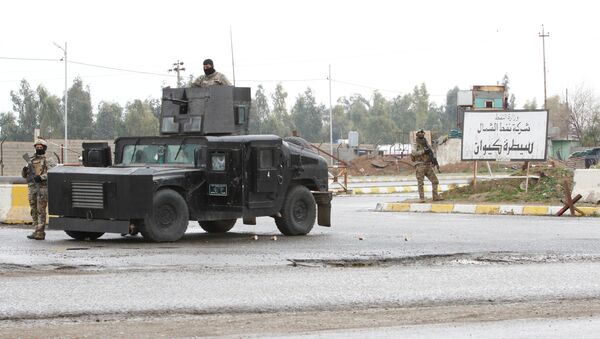MOSCOW (Sputnik) — Kurdish Peshmerga militia reportedly clashed with Iraqi Popular Mobilization Forces (PMF, or Hashd Shaabi) that were trying to enter Kirkuk from the town of Taza Khurmatu just south of the disputed region, Hemin Hawrami, senior assistant to Kurdish President Masoud Barzani, said Monday.
"I just spoke with our commanders near Taza Khurmatu, they said: PMF tried to advance twice, we pushed them back… A Peshmerge commander from first brigade confirmed that they have ambushed four advancing PMF Hamvees [Humvee, a light military truck], destroyed all of them and pushed them back in Taza Khuramtu," Hawrami wrote on Twitter.
Footage by a Peshmerga shows two Hashd al-Shaabi vehicles destroyed by Peshmerga forces near Taza, southern #Kirkuk — via @KURDISTAN_ARMY. pic.twitter.com/b8Wje1epZt
— Baxtiyar Goran (@BaxtiyarGoran) October 16, 2017
Hemin Hawrami also added that President Barzani ordered Peshmerga forces not to initiate any clashes, however, "if any advancing militia starts shooting, then Peshmerga are given green light to use every power to stand against them."
#Kirkuk: #Peshmerga troops and Iraqi forces exchange artillery fire in the South of the city as tensions reach breaking point. pic.twitter.com/2UNLNolCQK
— Rawchi (@Rawchihasan) October 16, 2017
Local media citing a Peshmerga commander reported that Iraqi Kurdistan’s Vice President Kosrat Rasul gave the order to additionally deploy as many as 3,000 Kurdish Peshmerga paramilitary militias. Rasul himself has already arrived in Kirkuk, the media added.
Earlier in the day, Iraqi Kurdistan’s Security Council said that the Iraqi government forces had started an offensive to gain control of the province of Kirkuk, including oilfields and air base west of the city. The disputed province has been under control of the Kurdish Peshmerga paramilitary forces since 2014, when the Kurds expelled the Daesh terrorist group’s forces from the region.
According to the Iraqi government Prime Minister Haider Abadi gave the order to the country’s army and police to secure bases, federal installations in Kirkuk, but avoid confrontations with the Kurdish forces.
"Commander-in-Chief Haider Al Abadi has instructed Iraqi Army, Federal Police, CTS [Counter Terrorism Service] to secure bases & federal installations in Kirkuk province. The PM orders ISF [Iraqi Security Forces] to cooperate with Peshmerga and avoid confrontations, and to protect all civilians in the province," the government wrote on Twitter.
The Pentagon called on Baghdad and Iraqi Kurdistan to avoid further escalation in Iraq, Laura Seal, a spokeswoman for the Department of Defense, said on Monday in a statement obtained by Sputnik.
"We strongly urge all sides to avoid additional escalatory actions. We oppose violence from any party, and urge against destabilizing actions that distract from the fight against ISIS [Islamic State, IS, a terrorist organization outlawed in Russia] and further undermine Iraq's stability," Seal said in the statement.
The spokeswoman added that the United States continues to "support a unified Iraq."
"Despite the Kurdistan Regional Government's unfortunate decision to pursue a unilateral referendum, dialogue remains the best option to defuse ongoing tensions and longstanding issues, in accordance with the Iraqi constitution," Seal stated.
She also reiterated that the Pentagon "remains focused on the fight against ISIS [Daesh]," and called on Baghdad and Erbil to focus on tackling this common threat instead if "stoking tensions among the Iraqi people."
Following Iraqi Kurdistan's independence referendum on September 25, Iraqi Prime Minister Haider Abadi received approval from the country's parliament to deploy troops to the province of Kirkuk, which is disputed between Baghdad and Erbil. Kirkuk held the vote too, despite not being a part of Iraqi Kurdistan.



